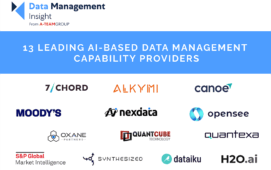As part of its global reference data management initiative, Deutsche Bank has contracted with Cicada Cos. to provide advisory and cleansing services to ensure compliance with Know Your Client (KYC) regulatory requirements. The German bank has adopted a risk-based approach to KYC compliance, which it believes has yielded many operational efficiencies and benefits as a byproduct of adhering to the regulations.
Counterparty or partner data is fast emerging as a hot spot within the reference data area. It appears the regulatory environment surrounding KYC is driving much of the impetus among financial institutions to get to grips with their often-wieldy client databases. The U.K. Financial Services Authority, in insisting that firms have accurate entity data for clients, counterparties and issuers worldwide, is emerging as the catalyst for this change globally.
According to David Paris, global head of information management services within Deutsche Bank’s global technology and operations group, regulatory requirements of KYC and Anti-Money Laundering (AML) measures in effect drove the bank’s efforts to ensure detailed legal and other identifying information about the entities with which it does business. As a result of the approach, the bank has begun to enjoy operational benefits, including offering its compliance and credit staff a riskbased view of bank counterparties.
Paris said the bank used Cicada as data quality advisor for the project, and DSL as business process outsource operator. DSL – originally spun off from Deutsche Bank in the 1990s and now an independent company based in India – provided the technology platform for the bank’s wider reference data management implementation (Reference Data Review, June 2004).
Deutsche Bank’s partner data strategy was outlined by Paris at a Cicada-sponsored briefing in London this month. The briefing – at which Reference Data Review offered a high-level industry overview – also featured an update on recent activities of the Reference Data User Group (RDUG), given by founder and secretary Anthony Kirby.
Deutsche Bank has established a set of guidelines for complying with the KYC requirements. These are based around five key steps, starting with the initial contact with a client or counterparty. This, primarily front-office function, Paris said, is key to getting the KYC data ball rolling in terms of gaining internal acceptance of the KYC data initiative. Once initial profiles are formulated, the second step is to gather (or validate) legal identifiers. The third step, ensuring adoption of these terms by the relevant operational unit, and the fourth, recording credit terms, relate to credit risk. The final step is to establish links between this data and the upstream and downstream applications that are affected by it.
Paris identified several key data fields that the KYC process requires: Party ID; Registered Address; Country of Registration; Business Purpose (NACE Code); Listing Information; Regulator Information; Shareholder Information; Director Information; PCR Information; and Trading Relationship Roles.
At Deutsche Bank, Paris’s team took a risk-based approach to managing KYC data. This entailed using separate strategies and technologies for managing the processes of rereviewing existing entity data and adding ‘new account’ data to its databases. “We regard new client data information as akin to transaction data,” Paris said, “and the review of legacy more akin to batch processing.”
This gives the bank a different perspective on each from a work flow management standpoint, with some activities outsourced to Cicada for cleansing and others to DSL for BPO management. Specifically, Deutsche Bank split its activities between new client/new account set-up and adoption, and revalidation of existing KYC data.
One of the by-products of this approach has been a new ability to assign risk parameters to counterparties. With help from the bank’s compliance staff, Paris’s team was able to develop heat maps identifying areas that need attention. By assigning numerical values to the colours on the map, Paris said, Deutsche Bank has been able to develop a risk-weighted view of its client base.
Deutsche’s counterparty data efforts are part of its wide-ranging DB Reference Data Programme, launched in 2002 (RDR, June 2004). The programme is aimed at enhancing data quality, optimizing investments in reference data projects and technology, readicating duplication of sources, moving the organization to a single ‘golden source’ of core reference data, and finally ensuring that this golden copy is adopted by downstream applications.
Cicada provides data management technology for both reference data and market data. Within the reference data segment, Cicada has focused on providing tools for acquiring, cleansing and integrating security and counterparty data to support risk management functions and straight through processing. Its services are based on its Composer infrastrucutre and Data Quality Management (DQM) analysts.
Subscribe to our newsletter




